Transform Your Outdoor Space: Landscape Gardening in Richmond
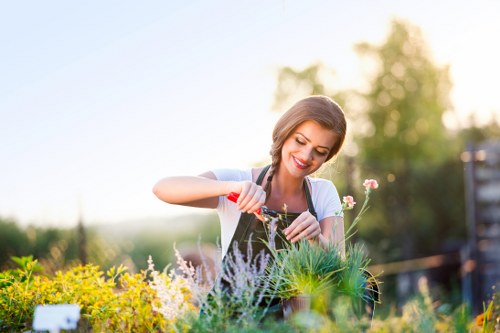
Introduction to Landscape Gardening
Landscape gardening in Richmond is more than just planting flowers and shrubs; it's about creating a harmonious outdoor environment that reflects your personal style and complements the natural beauty of the area. Whether you have a sprawling backyard or a compact urban garden, the principles of landscape gardening can help you design a space that is both functional and aesthetically pleasing.
Richmond's unique climate and soil conditions offer a diverse range of plants and design opportunities. By understanding the local environment and utilizing sustainable gardening practices, you can create a thriving garden that enhances your property's value and provides a serene retreat from the hustle and bustle of daily life.
In this article, we'll explore the key elements of landscape gardening in Richmond, including plant selection, design strategies, and maintenance tips to help you achieve a stunning outdoor space.
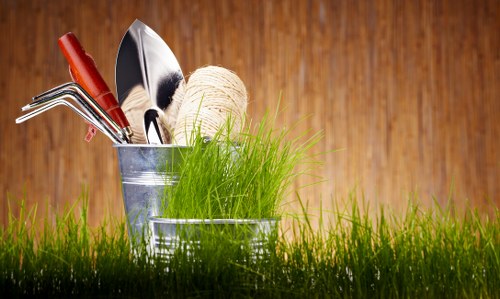
Understanding Richmond’s Climate and Soil
Richmond experiences a temperate climate with distinct seasons, making it an ideal location for a wide variety of plants. The region's relatively mild winters and warm summers allow for long growing seasons, which are perfect for both perennial and annual plants.
**Soil quality** is another critical factor in landscape gardening. Richmond's soil tends to be a mix of clay and loam, providing good nutrient retention but often requiring amendments to improve drainage and fertility. Conducting a soil test can help you determine the necessary adjustments to create an optimal growing environment for your plants.
By selecting native plants that are well-adapted to Richmond's climate and soil conditions, you can reduce the need for excessive watering and maintenance, promoting a more sustainable and low-maintenance garden.
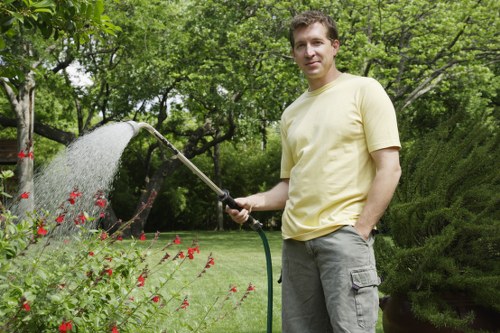
Plant Selection for Richmond Gardens
Native Plants
Choosing native plants is a smart strategy for landscape gardening in Richmond. These plants are naturally adapted to the local climate and soil, which means they require less water, fewer fertilizers, and minimal pest control. Some popular native plants for Richmond include:
- **Mountain Laurel** - Known for its beautiful spring blooms.
- **Virginia Sweetspire** - Offers stunning fall foliage.
- **Redbud Trees** - Provide vibrant pink or purple flowers in early spring.
Flowering Plants
Flowering plants add color and vibrancy to your garden. Consider a mix of annuals and perennials to ensure continuous blooms throughout the growing season. Some excellent choices for Richmond gardens are:
- **Hostas** - Ideal for shaded areas with their lush foliage.
- **Daylilies** - Hardy and low-maintenance with a variety of colors.
- **Lavender** - Fragrant and attracts pollinators like bees and butterflies.
Ornamental Trees and Shrubs
Ornamental trees and shrubs provide structure and year-round interest to your landscape. Popular options for Richmond include:
- **Japanese Maple** - Offers striking leaf colors and elegant form.
- **Boxwood** - Perfect for creating hedges and adding a formal touch.
- **Hydrangeas** - Known for their large, showy flower clusters.
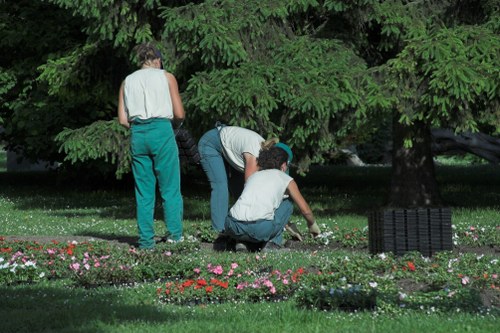
Design Principles for Landscape Gardening
Creating a Focal Point
A focal point serves as the anchor of your garden design. It draws attention and provides a sense of direction for the rest of the landscape. Effective focal points can include:
- **Water Features** - Such as ponds, fountains, or waterfalls.
- **Sculptures or Art Pieces** - Adding personality and visual interest.
- **Statement Plants or Trees** - Unique or particularly striking specimens.
Balancing Hardscaping and Softscaping
Achieving a harmonious balance between hardscape elements (like paths, patios, and walls) and softscape elements (plants, flowers, and lawns) is essential for a cohesive garden design. Consider the following tips:
- **Integrated Pathways** - Use natural materials that complement your plantings.
- **Defined Plant Beds** - Create structure with borders or edging.
- **Functional Outdoor Spaces** - Incorporate seating areas or outdoor dining to enhance usability.
Color Coordination
Using a consistent color palette can unify your garden design. Select colors that complement each other and reflect the overall theme of your landscape. For example, a palette of greens and purples can create a serene and elegant atmosphere.
Seasonal Interest
Design your garden to showcase different plants that bloom or change color throughout the seasons. This ensures that your landscape remains attractive year-round, with spring blooms, summer vibrancy, autumn hues, and winter structure.
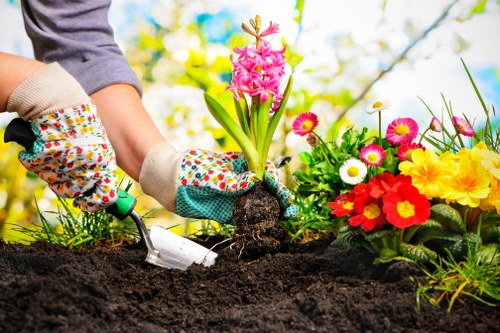
Maintenance Tips for a Thriving Garden
Watering Practices
Proper watering is crucial for the health of your garden. In Richmond, it's important to:
- **Water Early in the Morning** - Reduces evaporation and fungal growth.
- **Use Mulch** - Helps retain moisture and regulate soil temperature.
- **Install Drip Irrigation** - Efficiently delivers water directly to the plant roots.
Pruning and Trimming
Regular pruning and trimming help maintain the shape and health of your plants. Focus on:
- **Removing Dead or Diseased Branches** - Prevents the spread of pests and diseases.
- **Shaping Plants for Aesthetics** - Enhances the overall appearance of your garden.
- **Encouraging New Growth** - Promotes vigorous and healthy plants.
Soil Fertilization
Fertilizing your garden ensures that plants receive the necessary nutrients for growth. Use organic fertilizers to improve soil health and promote sustainable gardening practices.
Pest and Disease Management
Protect your garden by monitoring for pests and diseases regularly. Implement integrated pest management (IPM) techniques, such as:
- **Encouraging Beneficial Insects** - Like ladybugs and lacewings.
- **Using Organic Pesticides** - Minimizes harm to the environment.
- **Maintaining Plant Health** - Strong plants are less susceptible to problems.
Winter Preparation
Prepare your garden for the colder months by:
- **Protecting Sensitive Plants** - Using covers or relocating potted plants.
- **Cleaning Up Garden Beds** - Removing debris and preparing for spring planting.
- **Mulching** - Provides insulation against frost and temperature fluctuations.

Incorporating Sustainable Practices
Sustainable landscape gardening not only benefits the environment but also reduces maintenance efforts and costs. Consider implementing the following practices:
- **Rainwater Harvesting** - Collects and uses rainwater for irrigation.
- **Composting** - Recycles organic waste into nutrient-rich soil amendments.
- **Using Native and Drought-Resistant Plants** - Minimizes water usage and supports local ecosystems.
Eco-Friendly Materials
Choose environmentally friendly materials for hardscaping elements. Options include:
- **Recycled Stone or Gravel** - Reduces waste and adds natural beauty.
- **Sustainable Wood** - Certified by organizations like the Forest Stewardship Council (FSC).
- **Permeable Paving** - Allows water to infiltrate the soil, reducing runoff.
Energy-Efficient Lighting
Install energy-efficient lighting solutions to enhance your garden's beauty at night while conserving energy. Consider:
- **Solar-Powered Lights** - Harnesses solar energy for illumination.
- **LED Fixtures** - Long-lasting and consume less power.
- **Strategic Placement** - Highlights key features without excessive use.
Wildlife-Friendly Gardens
Design your garden to support local wildlife by providing habitats and food sources. Effective strategies include:
- **Planting a Variety of Species** - Attracts different types of pollinators and birds.
- **Creating Water Sources** - Such as birdbaths or small ponds.
- **Avoiding Pesticides** - Protects beneficial insects and animals.
Reducing Carbon Footprint
Implementing sustainable gardening practices helps reduce your carbon footprint. By minimizing the use of chemical fertilizers, conserving water, and choosing native plants, you contribute to a healthier environment.
Hiring Professional Landscape Gardeners
While DIY gardening can be rewarding, hiring professional landscape gardeners in Richmond can ensure that your garden is expertly designed and maintained. Professionals offer:
- **Expertise and Experience** - Knowledge of local plants and design trends.
- **Customized Design Plans** - Tailored to your specific needs and preferences.
- **Efficient Maintenance Services** - Keeping your garden healthy and beautiful year-round.
Investing in professional services can save you time and ensure long-lasting results, allowing you to enjoy a stunning landscape without the stress of constant upkeep.
Choosing the Right Landscape Gardener
When selecting a landscape gardener in Richmond, consider the following factors:
- **Portfolio and References** - Review past projects and client testimonials.
- **Certifications and Licenses** - Ensure they are qualified and legally compliant.
- **Communication and Collaboration** - Choose someone who listens to your ideas and communicates clearly.
Cost Considerations
Landscape gardening costs can vary based on the size of your garden, plant selections, and the complexity of the design. It's essential to obtain detailed quotes and understand what services are included to make an informed decision.
Long-Term Benefits
A professionally designed and maintained garden can enhance your property's value, provide a relaxing outdoor space, and contribute positively to the local environment. The investment in quality landscape gardening pays off through increased enjoyment and lower maintenance costs over time.
Conclusion: Embrace the Beauty of Richmond
Landscape gardening in Richmond offers endless possibilities to transform your outdoor space into a beautiful, functional, and sustainable environment. By understanding the local climate and soil, selecting the right plants, and incorporating thoughtful design principles, you can create a garden that thrives year-round.
Whether you choose to embark on this journey yourself or enlist the help of professional landscape gardeners, the result will be a stunning garden that reflects your personal style and enhances your quality of life.
Ready to transform your garden? Contact us today and let our experts help you design and maintain the perfect landscape for your Richmond home.